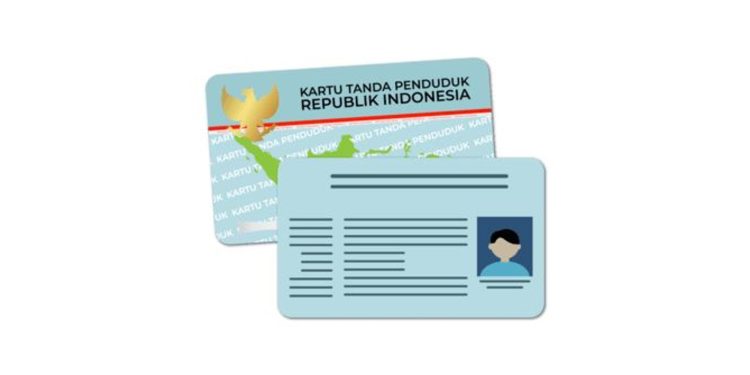Jakarta, Indonesia Sentinel — On January 3, Indonesia’s Constitutional Court (MK) rejected a court petition to remove religion column on the national ID cards. The decision upholds the mandate for all Indonesian citizens to declare their religion and fill it in their identity documents.
The petitioners had challenged Articles 61(1) and 64(1) of Law No. 23 of 2006 on Population Administration, which require citizens to declare their religion in official records. The court, however, dismissed their request.
“Constitutional court rejects the petitioners’ request beyond and in its entirety,” said Constitutional Court Chief Justice Suhartoyo while delivering the verdict, as reported by Kompas.
The court emphasized that Indonesia’s 1945 Constitution (UUD NRI 1945) and the nation’s founding ideology, Pancasila, do not recognize the absence of religion or belief in God as part of religious freedom.
In its legal considerations, the court argued that requiring citizens to declare adherence to a religion or belief in God is consistent with the aspirations of Pancasila and the Constitution.
The justices maintained that this restriction on individual freedoms is “proportional and not applied in an oppressive or arbitrary manner,” according to Constitutional Court Judge Arief Hidayat.
“Therefore, the applicants claim that Articles 61(1) and 64(1) of the Population Administration Law are unconstitutional, as previously interpreted by the court in Decision No. 97/PUU-XVI/2016, is legally unfounded,” Arief added.
Religious Freedom Concerns
Critics argue that the ruling undermines the principles of freedom of belief. Mohammad Iqbal Ahnaf, an academic from the Center for Religious and Cross-Cultural Studies (CRCS) at Gadjah Mada University, said the decision contradicts the principle of freedom of religion and belief.
“There is no law explicitly prohibiting individuals from being non-religious, but numerous administrative rules effectively force people to adhere to a religion,” Iqbal said, as reported by BBC. He pointed out that from birth registration to education, marriage, and even the presidential oath, Indonesians are required to declare a religion.
Indonesia officially recognizes seven religions: Islam, Christianity, Hinduism, Buddhism, Confucianism, and traditional beliefs. Citizens must identify with one of these in their official records.
Judge Arief noted that while declaring a religion or belief is mandatory for population data, the state imposes no additional legal obligations related to the chosen religion beyond respecting constitutional restrictions.
Court Petition
Reporting from Kompas, two Indonesian citizens, Raymond Kamil and Indra Syahputra, previously filed a judicial review challenging Articles 61(1) and 64(1) of Law No. 23 of 2006 on Population Administration which mandate the inclusion of a religion column on family cards and ID cards.
The petitioners argued that these provisions discriminate against individuals who do not adhere to a specific religion or belief system, according to Kompas.
Their demands extended beyond removing the religion column from official documents. They also sought amendments to Law No. 1 of 1974 on Marriage to accommodate unions for those without religious affiliations and revisions to Article 27 of Law No. 20 of 2003 on the National Education System to ensure that religious education is not mandatory.
Concerns Over Religious and Social Stability
Indonesia’s Minister of Religious Affairs (Kemenag), Nasaruddin Umar, praised the Constitutional Court’s decision to reject the petition, emphasizing its significance for maintaining societal harmony.
“The court’s decision is crucial. There was a group asking for the freedom not to have a religion or to exclude it from ID cards. The court rejected this,” Nasaruddin said, as reported by Merdeka on January 11, 2025.
Los Angeles Wildfires Rage On, Thousands Evacuated Amid Record Destruction
Nasaruddin warned that granting the petition could lead to widespread confusion in religious practices across the nation. “If such a request were approved, society would descend into chaos. While also without religion listed on ID cards, it would be difficult to identify someone’s faith,” he explained.
He highlighted the importance of the religion column in contexts such as marriage. “The religion column strengthens the enforcement of Law No. 1 of 1974, which states that a valid marriage must be conducted according to the couple’s respective religions,” Nasaruddin added.
Preserving Religions Harmony
The Minister also underscored the role of religious harmony in safeguarding Indonesia’s integrity. “The only way to destroy Indonesia is by pitting religious communities against each other. If we remain united, no force can divide the Republic of Indonesia,” he stressed.
Nasaruddin urged citizens to resist provocations aimed at disrupting national unity. “Be cautious and don’t allow yourselves to be manipulated by forces that seek to weaken Indonesia. Religious harmony is this nation’s greatest strength,” he stated.
He called on religious leaders to continue fostering unity and avoiding divisive rhetoric. By upholding harmony, Nasaruddin said, Indonesia could not only become a global model for interfaith coexistence but also strengthen the nation’s identity and sovereignty.
(Raidi/Agung)


























